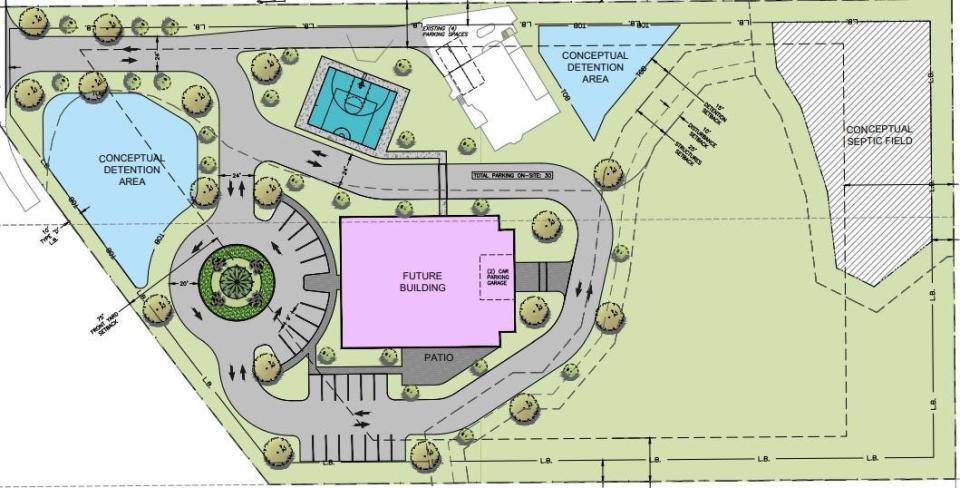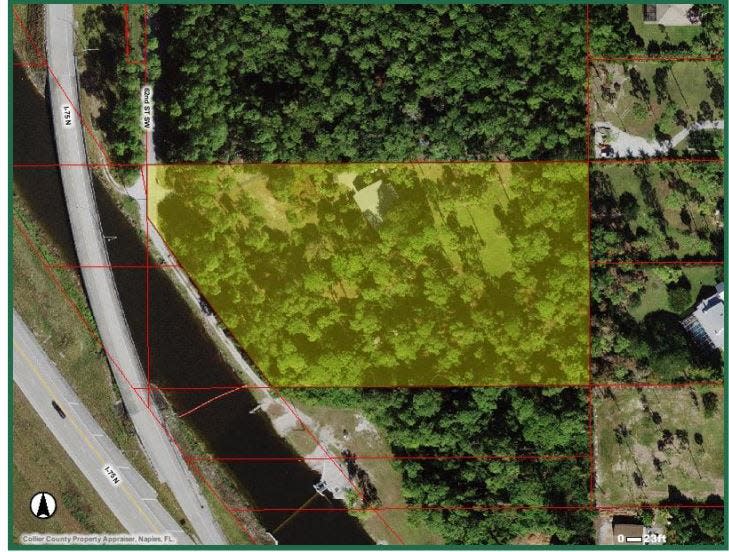Naples mental health center's plan to build group home riles some neighbors
The David Lawrence Centers is embarking on another expansion project that nearby residents say they feel powerless to stop.
The private, nonprofit mental health center wants to rezone 4.5 acres on 62nd Street Southwest on the south side of Golden Gate Parkway and east of Interstate 75.
The center plans to build an 18,000-square-foot group home with 24 single-occupancy rooms as transitional housing for recovering addicts.
The site has a single-family home on it that David Lawrence owns and uses for six men in recovery. The home would continue to be used as transitional housing for recovering addicts.
The property is zoned residential and would change to planned unit development.
The 24-bed project is one of two recent undertakings by David Lawrence to address an escalating need for more mental health and drug treatment beds in fast-growing Collier County. The center has wait lists for beds.

David Lawrence served 57,000 substance abuse patients in fiscal year 2022, according to the center’s annual report.
In February, a 5-acre site on the north side of the parkway that David Lawrence owns near its campus was the subject of a lengthy rezoning hearing with 70 participants in support and against the rezoning from residential to community facilities.
A patient intake center with 102 beds in a 64,000-square foot complex was planned yet has been revised to 87 beds. The plan now is a 55,000-square-foot building, according to David Lawrence officials.
The Collier County Commission approved the rezoning even though its Planning Commission last November voted unanimously against it.
The intake center will be a joint endeavor; the county will build it using money from the one-cent sales tax increase approved by voters in 2018. David Lawrence will donate the land to the county and have a 30-year lease to operate it.
What do neighbors say?
Nearby homeowners say both projects are incompatible to the single-family zoning of Golden Gate Estates and say David Lawrence is turning a blind eye to the anguish and public safety hazard that will be created.
“They don’t care about the mental health of the people around them,” Elizabeth Bloch, a Golden Gate Parkway resident, said. “We are being surrounded by a high-risk population. Recovering addicts means many of them will use. This is a population that knows how to skirt the rules.”
Recovering addicts leave David Lawrence now on foot looking for drugs, trespass and some have knocked on doors of nearby homeowners, she said.
The Collier commission was indifferent to the residents’ outcry over the patient intake center; Bloch expects no change of heart for the latest project.

“I don’t know if anyone can stop it,” Bloch said. “Once again we are likely to be steamrolled. The county is just going to rubber stamp it.”
Penelope Hayes, who organized 35 residents in hopes of stopping the rezoning for the intake center, is not optimistic the county board will listen to the neighbors’ concerns over the group home.
“Given the last result, I am challenged to have faith in our county commissioners,” Hayes said in an email.
The 18,000-square-foot complex to house 27 recovering drug users is planned on a residential street of single-family homes, Hayes said.
“There is no justification for this gross incompatibility,” Hayes said.
What does the new project involve?
David Lawrence bought the property with the single-family home at 3150 62nd Street in 2019. It opened the “recovery residence” called Hope Home, for six men only, the following year.
Having six unrelated individuals living together is allowed because it is not classified as a group home since it does not have paid staff, said Nancy Dauphinais, chief operating officer of David Lawrence.
More: Rezoning for mental health center in Collier County approved; neighbors plan legal action
More: Naples businesses settle misleading ads for $7.6 million for 'Smoke Away' products
One individual is a senior resident in charge of making sure rules are followed, which include a curfew that is generally from 10:30 p.m. to 5 a.m. on weekdays.
On weekends the curfew is midnight to 5 a.m. There can be no unauthorized visitors or substance use. Violations can result in being kicked out.
Building a 24-bed transitional housing center does require rezoning to planned unit development, she said. It will be two stories with a senior resident on each floor with similar curfew and house rules.
“It is designed to be a large home,” she said.
A neighborhood information meeting scheduled for Tuesday is part of the rezoning process. Homeowners and businesses within a one-mile radius were notified.
Dauphinais said there has not been any neighbor outcry to date but acknowledges it is likely. Many of the nearby property owners who have been notified are the same as those who oppose the patient intake center on the north side of the parkway now planned at 55,000 square feet.
“We are open to listening and (a) dialogue with the neighbors,” she said. “We are waiting to see what the feedback will be.”
For the patient intake center, still being designed, David Lawrence agreed to have monthly meetings with the neighbors and a 10-foot wall will be built along two sides of the complex. The Collier County Sheriff’s Office said it would do more patrols in the vicinity.
Who would the residents be?
Dauphinais said the 24-bed single occupancy rooms would be for men only, similar to the six-bedroom house on the site that will continue to operate. The typical length of stay is six months to one year.
“It is transitional supportive housing,” she said. “It is not permanent housing and not a shelter.”
The estimated cost of the 24-bed complex is $6 million; this past spring David Lawrence submitted a local funding request to the state Legislature for $3 million and it was approved.
The intent is to build to capacity because of the shortage of recovery beds now in Collier.
A similar recovery residence for women at a different location would be considered down the road, Dauphinais said.
What’s critical is transitional housing where medication assisted treatment, known as MAT, for opioid addiction recovery is allowed, she said.
At last count in Collier, there were 25 transitional housing beds for men and 10 for women where MAT is permitted.
This article originally appeared on Naples Daily News: Golden Gate neighborhood feels powerless against mental health center

